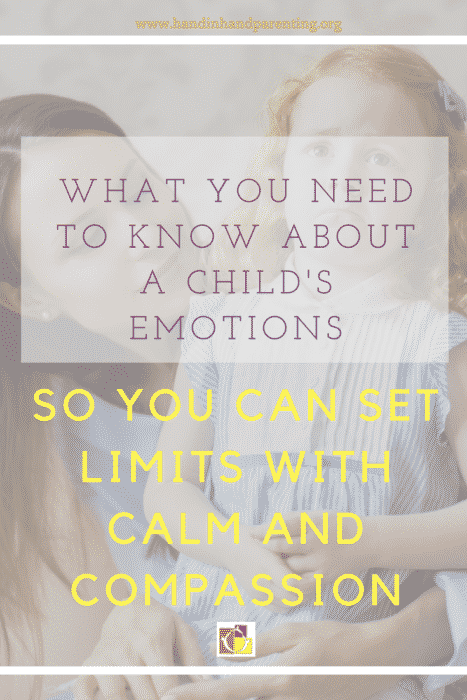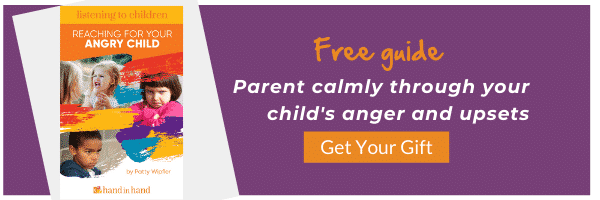A Guest Post with Marion Rose
A child's challenging behaviours can be one of the most challenging aspects of parenting. We often fall back on the bribes, punishment and coercion that may have been used by the caregivers that raised us as even if we second guess them and even if we have vowed to move on, towards a calmer more compassionate approach, that ideal can be hard to maintain.
Here, Dr Marion Rose shares what lies behind the whining, resistance and aggression that children often display, and why these behaviours can test us as parents. Read on to find out more about an empathic approach to setting limits that says “no” to behaviour but “yes” to the feelings causing them.
Setting Limits with Marion Rose
Why does setting limits with children so often feel like a battleground?
I love seeing that our child’s true nature, and our true nature too, is love. Connection, cooperation, contribution naturally arise from that true nature.
When they’re acting in ways that aren’t loving, it’s easy to fall back into the behaviourist paradigm that most of us grew up in – that challenging behaviours required information, coercion or punishment.
But the more we can remember that our child’s true nature is love and that challenging behaviours are caused by one of three things: a need for information, an unmet need, or pent-up painful feelings, the more we can go through this list to help our child return to her true nature.
How can we move away from bribes, punishment, and coercion? What does a loving limit look like?
I call them loving limits because they are a limit plus love.
If the situation is not urgent, for example, a child asks for another book to be read after we said it would be the last one and we can see from their behaviour that their request is part of trying to prevent their feelings from coming out, or if they’re trying to find a pretext to have a cry by whining for the bowl that’s in the dishwasher, I like to give empathy first, and then set the loving limit:
“I hear that you really want me to read you another book, sweetheart, and I’m not willing to read any more books now….”
We will often repeat the loving limits, which help the feelings flow:
“I really hear how you, sweetheart… you really want me to read you another book. And I’m not willing to read anymore now. I’m right here with you. I’m listening. I hear you.”
Questions About Limits on Safety
What about safety? Can a limit still be warm if we need to set it fast?
If there’s something urgently happening where someone could get hurt or something could get damaged, I recommend setting the limit first and following it with empathy;
Set the limit: “I won’t let you hit your sister, sweetheart.” (It may need to be accompanied by the minimum amount of physical action required to stop the behaviour.)
Follow with empathy: “and I’m right here with you. I’m listening.”
The limit in itself is also loving, in that we can aim for our eye contact, tone of voice, and actions to have a quality of compassion rather than harshness or punitiveness.
We’ll often need to repeat the limit and the empathy, to help our children stay connected with the feelings that are underlying the behaviour. That’s where we’re saying “no” to the behaviour and “yes” to the underlying feelings.
You have said that discipline is based on meeting everyone's needs. Can you explain how that works? Where does the parent factor in setting limits?
Meeting everyone’s needs means consistently looking at what each person in the family is needing and being committed to value each person’s needs. The idea is to creatively find ways that are most likely to meet everyone’s needs.
There are a couple of important reasons for loving limits. The first is about our needs and feelings and the second is about their needs and feelings.
A Parent's Needs:
The first is when we as parents have an authentic “no” in response to what our child is doing, that is about us and our needs.
For example, your 8-year-old might be asking repeatedly to get them a drink of water – which they can clearly do for themselves. If we say “Yes” and respond by doing what they are asking when actually we aren’t wanting or willing to do it, then our behaviour isn’t congruent with our feelings and energy, and children can feel that.
That can lead to them feeling confused – because they can sense the incongruence – and they might then keep on asking for that thing more and more, as they search for a congruent response.
Or they may grow up not trusting their inner barometer, their sense of what’s going on.
When we repeatedly do things that we’re not willing to do, which our child can do for themselves, we can also end up feeling resentful.
As parents, getting clearer and clearer about our own needs, and expressing our “no’s” lovingly and compassionately is really helpful for our children.
Then there are many times when our child really does need our help, such as when they are too young to be able to do something for themselves.
At these times, self-empathy can be really helpful, so that we can find our willingness to respond to them, despite our other needs and feelings.
Being heard by our Outer Loving Crew (as I call them) is also really important so that we get to express our frustration around the things that we do that we don’t really want to do.
A Child's Needs
The second important reason for loving limits is when our child is acting in a way that clearly lets us know that they have some pent-up painful feelings that are not coming out in tears or tantrums, laughter, play or talking, but are coming out in aggression, or in them repeatedly doing things that they know we don’t enjoy, or when they’re ‘whining’ or showing us in other ways that what they really need is some help to let out the underlying feelings.
Loving limits are one option at this time so that we can say a loving “no” to the behaviour and a loving “yes” to the feelings.
This way, those feelings can come out in the form of expression, so the child can return to their loving, compassionate selves.
What can we do when we really need something to happen – like taking the school bus – and it just doesn't seem like it's going to happen?
I love Aletha Solter’s suggestion to help cooperation be more likely to happen:
- Give the information clearly: “We’re going to the car in the next half an hour.”
- Give choices: “Would you like to walk, or for me to carry you?”
- Make it fun: “Let’s play I’m a little tiny puppy, and you’re the big mummy puppy, chasing me to the car”.
Moving Away From Bribes, Punishment and Coercion for Good
Even when we know there are reasons behind behaviour, we can often resort to offering bribes or issuing punishments and consequences. Why is it so hard for us as parents to move in and set warm, loving limits?
What I love is remembering that often the same three reasons that cause our child’s use of power-over or aggression are the same three reasons that drive us to want to coerce or punish or use power-over them. Aletha Solter talks about these three reasons, and I find them SO helpful to keep in mind:
The first is information.
 In those moments, we go back to old ways of thinking that we grew up with – that they are enjoying it, that they need to ‘learn better’, that they need to be punished to learn to behave. Consciously choosing to remember a more compassionate way of thinking about WHY they are doing what they are doing can really help us feel compassionate, and respond compassionately.
In those moments, we go back to old ways of thinking that we grew up with – that they are enjoying it, that they need to ‘learn better’, that they need to be punished to learn to behave. Consciously choosing to remember a more compassionate way of thinking about WHY they are doing what they are doing can really help us feel compassionate, and respond compassionately.
The second is unmet needs.
As parents in a culture that doesn’t value parenting, we often have many unmet needs ourselves – particularly for connection, choice, support, empathy, rest and play.
When we are feeling painful feelings as a result, it can be really hard for us to be able to feel connected with our children, especially if we’re feeling powerless and frustrated.
The more we can find ways to meet our needs on an ongoing basis, the less our needs cup is going to feel empty.
The third is painful pent-up feelings.
Our children acting in certain ways often remind us of events from our own childhoods, and those feelings come up to be heard and healed.
The thing is, we often feel those feelings so strongly that they seem to be about our child. For example, if our daughter is hitting her baby brother, it might remind us of when we were hit by our bigger sibling, and we might feel the response in the now that actually belongs to our childhood. We become the little sibling. We might feel outraged, and that might come out as a punishment for our daughter.
The more we get to express the hurts from our childhood to loving listeners, the less those feelings and responses get directed to our children, and the more we are able to be the parent and clearly see our child and what’s really going on for her.
What else should parents know about setting loving limits?
As Hand in Hand talks about so beautifully when behaviour is caused by painful pent-up feelings the whole point of a loving limit is not just to stop the behaviour. It’s to give the conditions that help underlying feelings flow out.
In this case, we’re not expecting our child to say, “Okay Daddy, I’ll stop!”
What we are expecting is that those loving limits help all those underlying feelings come out in the form of crying, raging, or tantrums. These are big and loud and expressive – and they are all part of the feelings that were causing the behaviour!
When the loving limit is more about our needs rather than theirs, we might also expect that they might feel some painful feelings that require empathy. They might feel sad and disappointed if we say “no” to going to the park. Again, if we have the inner resources we can aim to listen compassionately. “You really wanted to go to the park, sweetheart? I hear you. I’m listening.”
Read A Great Phrase To Use To Set Limits Without Blame or Shame
And How To Handle a Child's Whining Calmly When You Need to Leave
Get Hand in Hand's Setting Limits and Building Cooperation class free with your Parent Club Membership. Click here for details.
Meet Marion Rose
 Dr Marion Rose helps parents find compassion for themselves and their children. She is an Aware Parenting Level 2 instructor and runs workshops in Australia and the UK. You can find out more about Marion and her work here.
Dr Marion Rose helps parents find compassion for themselves and their children. She is an Aware Parenting Level 2 instructor and runs workshops in Australia and the UK. You can find out more about Marion and her work here.

